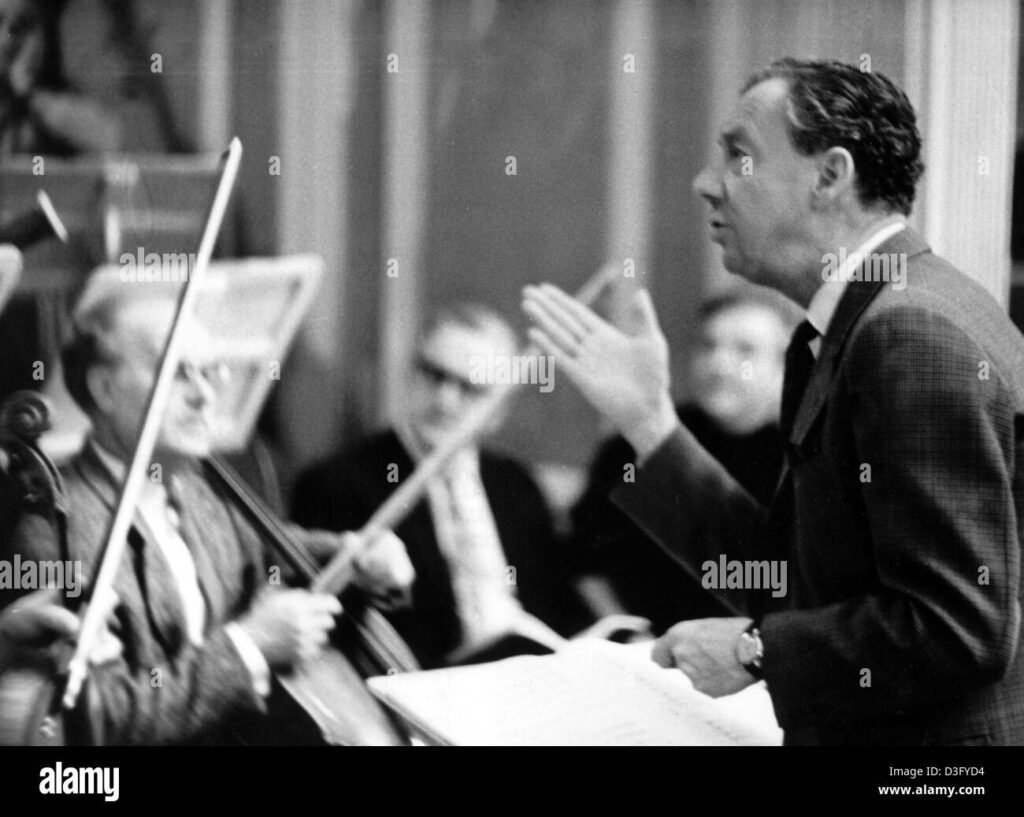A group of former schoolboys who sang on the world-famous 1963 recording of Benjamin Britten’s War Requiem have been reunited, thanks to an advert placed in a local newspaper. The recording, which sold 200,000 copies in just five months—an impressive feat for a classical work—earned Britten two Grammy Awards. However, the young choristers from London’s prestigious Highgate School were never credited.
Last year, Decca Records launched a search for the surviving members through an announcement in the Ham & High newspaper. On Thursday, 15 of them gathered in Soho to listen to a remastered version of the War Requiem and reminisce about the intense experience of recording the masterpiece.
Tim Healey, who was just 13 at the time, recalled the experience as “gruelling” yet awe-inspiring. “It was like going through some great storm, a great orchestral storm,” he said. “By the time it was over, I was quite glad, but looking back, I realize how amazing it was.”
Another former chorister, Nigel Law, shared a vivid memory of Russian soprano Galina Vishnevskaya’s emotional outburst during the recording. Vishnevskaya, who was placed on a balcony with the boys, was upset by her position, not understanding that Britten had designed the performance to reflect different physical planes, with the soprano and choir elevated to symbolize heaven.
The War Requiem was commissioned for the consecration of the new Coventry Cathedral in 1962, following the destruction of the original 14th-century structure during World War II. The piece blends the Latin text of the Requiem Mass with the anti-war poetry of Wilfred Owen, creating a deeply moving and harrowing work that was hailed as a masterpiece from its premiere.
The choristers were profoundly affected by Owen’s poetry, especially during the Cuban Missile Crisis. Healey recalled the impact of Owen’s poem Futility, saying, “Those anti-war lyrics had a deep resonance at the time. It made me question, what is the point of it all, if the world might end tomorrow?”
The original recording was made at Kingsway Hall in Holborn, and Britten’s involvement was a memorable part of the experience for the boys. Decca Records recently reissued the recording, restoring the fragile master tapes by baking and digitizing them. In the process, they also unearthed recordings of the original rehearsals, where Britten guided the choir.
“Boys, I know it’s early, but please don’t make it sound like it is,” Britten can be heard instructing. “Don’t make it sound nice. It’s horrid, it’s modern music.”
The comments took the former choristers back to the recording studio. Law reflected on how Britten’s use of tonal ambiguity challenged the boys’ usual approach. “I thought we were supposed to sound nice,” said Healey, “but he wanted something with more earthiness and bite.”
The 1963 recording remains one of the definitive versions of War Requiem, alongside other notable interpretations by Richard Hickox and Carlo Maria Giulini.
Although Britten’s later legacy was partially overshadowed by posthumous accusations related to his fascination with teenage boys, those controversies were far from the minds of the choristers who reunited. Instead, they focused on the emotions, excitement, and joy they experienced working with the legendary composer.
Many of the former choristers went on to have successful careers, with some staying in music, like renowned composer John Rutter and John Blakely, a longtime professor at the Royal College of Music. Others took different paths, such as Nigel Law, who became a software engineer, and Michael Cook, who now runs a charity for those in the dairy industry.
For Healey, the reunion was a deeply moving experience. “It’s been absolutely overwhelming,” he said. “Seeing people whose names and places in my life I had forgotten has been wonderful.”
Also read: Lala Kent Shares Heart-Wrenching Details Of Daughter’s Traumatic Birth Experience
